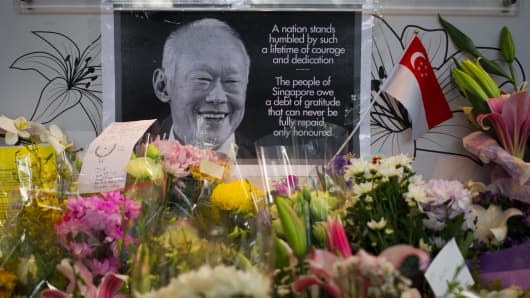 The death of Singapore's founding father marks a milestone
in the island-nation's 50-year history and raises questions about what
the next decade will bring for the country's political system.
The death of Singapore's founding father marks a milestone
in the island-nation's 50-year history and raises questions about what
the next decade will bring for the country's political system. Lee Kuan Yew (LKY) was considered one of Asia's greatest statesmen for turning a fishing village into a first-world economy, but his political ideology made him a controversial figure at home and abroad. His vision centered on a one-party political system, manifested by the People's Action Party (PAP) that he co-founded, which combined elements of capitalism and a state-directed economy.
Strict controls over freedom of speech and censorship are among his more contentious policies, but Mr. Lee's passing should now allow for a more open debate on
those issues, Michael Schuman, TIME Magazine's business correspondent for Asia, told CNBC on Monday.
Read MoreLee Kuan Yew's most memorable quotes
"You can make the argument that though LKY had tremendous success, it may be time for a change. He made the case for having a soft authoritarian government…Now, times have changed and I think Singapore will revisit his ideas and say: this worked in the past, but do we need something else going forward in the future. Do we need to have more political and social change? Those are the big questions going forward."
A pluralistic system?
Political opposition in the tiny Southeast Asian
city-state is limited to a few names including the Workers Party, the
Democratic Progressive Party and The Singaporeans First Party, which was
formed last year. Some say that Mr. Lee's policies, like restrictions
on public protests, have limited the ability of these parties to grow,
but they are still gaining traction. During the 2011 general election,
the opposition won a collective 40 percent of the vote.
Going forward, Ernest Bower, senior adviser at the Center for Strategic and International Studies (CSIS), believes the city will shift to a pluralistic political system.
Going forward, Ernest Bower, senior adviser at the Center for Strategic and International Studies (CSIS), believes the city will shift to a pluralistic political system.
"Singaporeans will harvest the legacy that LKY has given
them of an excellent education and global linkages and they will loosen
up and create more political space," he said. "Singaporeans will be able
to have a more normal governance structure than they have had in the
past, so finding consensus rather than implementing the views of a
political genius."
"I think there's a genuine, palpable desire for people wanting political plurality. That's been like a genie kept in a bottle, and now the genie is completely out," agreed PN Balji, strategist at RHT Digital & Media and former deputy editor of The Straits Times, alluding to increasingly opinionated social media users as well as several protests last year on issues related to government transparency.
"I think there's a genuine, palpable desire for people wanting political plurality. That's been like a genie kept in a bottle, and now the genie is completely out," agreed PN Balji, strategist at RHT Digital & Media and former deputy editor of The Straits Times, alluding to increasingly opinionated social media users as well as several protests last year on issues related to government transparency.
Upcoming elections
Singapore will hold its next general election sometime
before January 2017 and political observers say it will be a real test
for the ruling PAP.
Read MoreTributes for late Lee Kuan Yew flood Twitter
Lee's passing may complicate the timing of elections, said Citi analyst Kit Wei Zheng in a note on Tuesday. She believes the vote could be delayed until September 2016, instead of May or June: "While some may think having elections earlier can gain sympathy votes, this might be viewed as too opportunistic and thus backfire in our view."
Bower at CSIS expects the opposition, led by the Workers Party, to receive a larger share of the vote this time around, which should see Singapore's political landscape resemble a globally-accepted two-party system where parties compete for ideas.
"I'm telling Washington that, geopolitically, we have to be ready for a Singapore that's less decisive," he said.
Read MoreTributes for late Lee Kuan Yew flood Twitter
Lee's passing may complicate the timing of elections, said Citi analyst Kit Wei Zheng in a note on Tuesday. She believes the vote could be delayed until September 2016, instead of May or June: "While some may think having elections earlier can gain sympathy votes, this might be viewed as too opportunistic and thus backfire in our view."
Bower at CSIS expects the opposition, led by the Workers Party, to receive a larger share of the vote this time around, which should see Singapore's political landscape resemble a globally-accepted two-party system where parties compete for ideas.
"I'm telling Washington that, geopolitically, we have to be ready for a Singapore that's less decisive," he said.

No comments:
Post a Comment